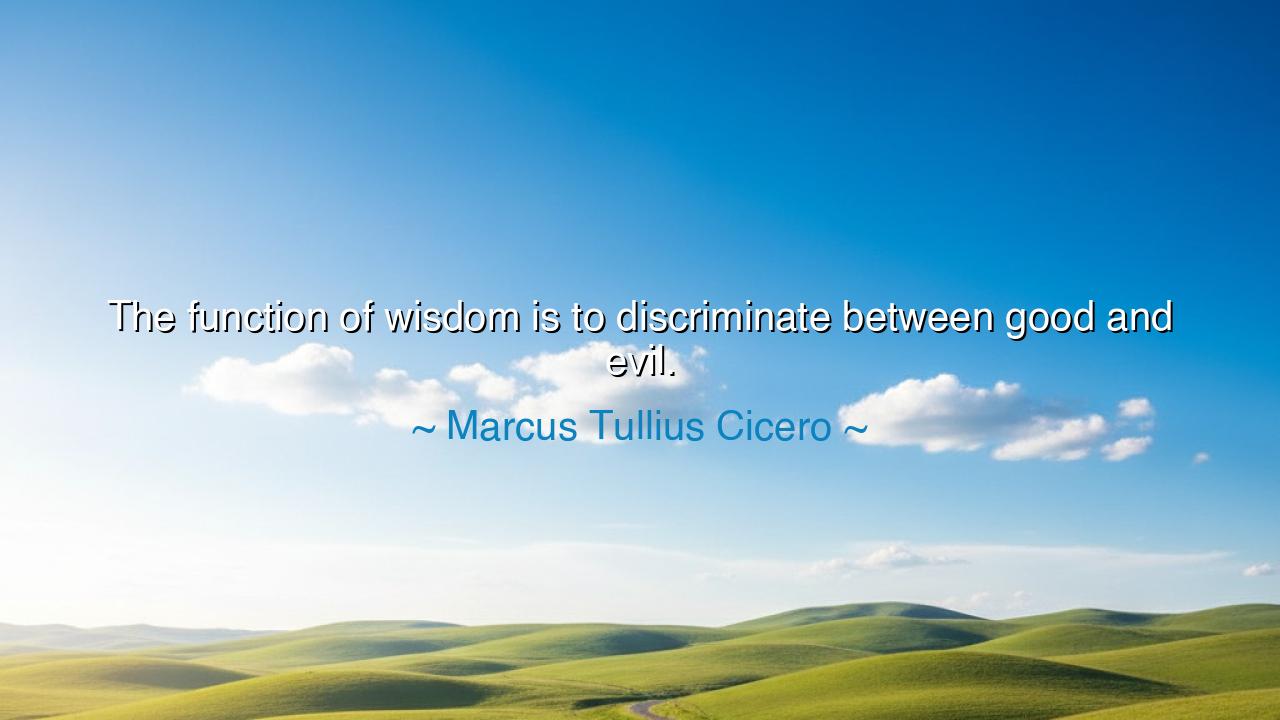
The function of wisdom is to discriminate between good and evil.






Hearken, O children of the ages, to the profound words of Marcus Tullius Cicero, the great Roman orator and philosopher, who speaks of the sacred duty of wisdom. He teaches that the highest purpose of wisdom is not in lofty speeches or clever reasoning, but in the ability to discriminate between good and evil. For life is a battlefield where virtue and vice contend, and only through discernment can the soul walk the path of righteousness.
Cicero reminds us that knowledge alone is not wisdom. A man may possess vast learning and yet wander astray if he cannot distinguish good from evil. True wisdom lies in applying reason and conscience to every decision, perceiving not only what is beneficial to oneself, but what is just, noble, and aligned with the harmony of the universe. This act of discrimination is the foundation of moral strength and the guardian of civilization.
Consider Cicero’s own life, set amidst the turbulence of the late Roman Republic. When the republic trembled under corruption and ambition, Cicero stood as a voice of justice, striving to discern what was right for the people amidst deceit and political chaos. In opposing the conspiracy of Catiline, he demonstrated the function of wisdom in action: recognizing the hidden evil that threatened Rome and summoning the courage to confront it. His choices were not easy, yet they were guided by the clarity of moral discernment.
This principle extends beyond rulers and philosophers. In every household, marketplace, and field of labor, men and women face choices that shape their character. The farmer who resists greed, the judge who refuses a bribe, the teacher who nurtures truth—each practices the sacred work of distinguishing good from evil. Without such discernment, communities crumble, and chaos reigns.
O children of the future, carry this teaching in your hearts: seek not only knowledge, but wisdom, which is the light by which knowledge is guided. When faced with temptation, deception, or conflict, pause and discern carefully. Ask yourself not merely, “What can I do?” but “What is right to do?” In this practice lies the strength of nations, the purity of the soul, and the harmony of the world.
Thus Cicero’s voice echoes across the centuries: that the truest and most noble work of wisdom is to judge rightly between the paths of light and darkness, leading humanity ever closer to justice, peace, and enduring greatness.






Qqaz123
This makes me question the interplay between perception and morality. If wisdom’s function is moral discernment, how do we account for situations where ‘good’ and ‘evil’ are not universally agreed upon? I wonder if Cicero envisioned wisdom as something innate or cultivated through experience and reflection. Could the development of wisdom depend on exposure to diverse perspectives and ethical dilemmas, training us to see beyond immediate appearances to deeper truths about human behavior?
Ccocoixoaime
Cicero’s statement prompts me to think about the responsibility tied to wisdom. If the ability to discriminate between good and evil defines wisdom, does possessing it carry an ethical obligation to act accordingly? I’m curious about historical examples where wisdom was present but not applied—does inaction diminish one’s wisdom? How do we reconcile the theoretical understanding of good and evil with the practical challenges of real-world decisions?
Qquang
I’m intrigued by the idea that wisdom is essentially evaluative, focused on moral discernment. Does this imply that someone can be intelligent or knowledgeable but still lack wisdom if they cannot judge actions ethically? I feel this raises questions about education and character development—how can society nurture wisdom as a moral skill rather than just an intellectual one? Can we ever fully separate personal bias from the judgment of good and evil?
L724. Ngo Thi Khanh linh 7A9
This quote makes me reflect on the practical application of wisdom. If its function is to distinguish right from wrong, what tools or frameworks help us make these judgments? I’m concerned about situations where moral choices are complex or ambiguous—can wisdom provide clear guidance, or is it more about balancing competing values? I’d like a perspective on how philosophy and lived experience interact in forming this capacity to discriminate between good and evil.
GDGold D.dragon
Reading this, I find myself pondering the relationship between wisdom and morality. If wisdom’s main role is to discern good from evil, does that mean knowledge or intelligence alone is insufficient? I wonder how subjective this discrimination can be across different cultures and eras. Can wisdom truly be universal, or is it always shaped by societal norms and personal experiences? How do we cultivate the kind of wisdom that consistently leads to ethical action?